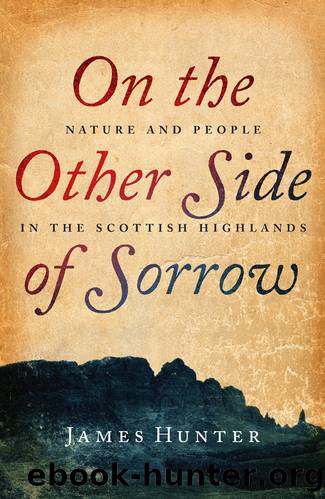On the Other Side of Sorrow by James Hunter

Author:James Hunter
Language: eng
Format: epub
Publisher: Birlinn
On reading this, you feel Scott, as it were, come tapping slyly on your shoulder. And, just like Waverley, you feel the spell which Scott himself has cast begin at last to break. Highlanders, you realise, for all their primitive charm, could not be permitted to get in the way of progress. Theirs, you are inclined to agree with Waverley, was a heroic, strangely captivating, lifestyle. But it was also, as Scott has finally got round to reminding you, a barbaric and outmoded one. So Culloden, you conclude, was maybe for the best. And not just Culloden either. For if you were one of the thousands who read Waverley in the year or so following the novelâs publication in the summer of 1814, that gentle tapping on your shoulder â as well as adding to your enjoyment of Scottâs fiction â might well have helped forestall such unease as you might otherwise have experienced on learning of the eviction of so many families from Strathnaver. For what was the expansion of sheep-farming but one more manifestation of civilisationâs onward march? And what were the clearances but one more instance of the price the world has to pay for such advancement?
Walter Scottâs swashbuckling clansmen and Patrick Sellarâs âaboriginesâ, then, are arguably the two sides of a single coin. Highlanders, from Scottâs perspective every bit as much as Sellarâs, were fated, if not to vanish from the earth, then certainly to be extinguished as a culturally distinctive people. And even if Highlanders were to disappear entirely, what then? The empty glens which so depressed a man like Hugh MacLennan, those glens where this Canadian thought that everyone who ever mattered was now dead and gone, were not to be viewed in such a light by more than a tiny minority of their visitors. Where MacLennan was to see a depopulated and deserted countryside, Patrick Sellar and his successors were to see thriving sheep farms or flourishing deer forests. Where a North American novelist was to be saddened by thoughts of what had been destroyed, a million other tourists were to be captivated by landscapes possibly made more, not less, appealing by a sense of their having once been home to a race which Walter Scott, like James MacPherson, had imagined to be doomed. Many years after the event, the Edinburgh publisher, Robert Cadell, was still recalling the âextraordinary sensationâ caused in 1810 by the publication of Scottâs The Lady of the Lake:
The whole country rang with the praises of the poet. Crowds set off to the scenery of Loch Katrine, till then comparatively unknown; and, as the book came out just before the season for excursions, every house and inn in that neighbourhood was crammed with a constant succession of visitors.18
Download
This site does not store any files on its server. We only index and link to content provided by other sites. Please contact the content providers to delete copyright contents if any and email us, we'll remove relevant links or contents immediately.
Zero to IPO: Over $1 Trillion of Actionable Advice from the World's Most Successful Entrepreneurs by Frederic Kerrest(4575)
Machine Learning at Scale with H2O by Gregory Keys | David Whiting(4314)
Never by Ken Follett(3958)
Harry Potter and the Goblet Of Fire by J.K. Rowling(3860)
Ogilvy on Advertising by David Ogilvy(3624)
Shadow of Night by Deborah Harkness(3370)
The Man Who Died Twice by Richard Osman(3081)
Book of Life by Deborah Harkness(2939)
The Tipping Point by Malcolm Gladwell(2927)
Will by Will Smith(2922)
Purple Hibiscus by Chimamanda Ngozi Adichie(2858)
0041152001443424520 .pdf by Unknown(2846)
My Brilliant Friend by Elena Ferrante(2832)
How Proust Can Change Your Life by Alain De Botton(2818)
How to Pay Zero Taxes, 2018 by Jeff A. Schnepper(2655)
Hooked: A Dark, Contemporary Romance (Never After Series) by Emily McIntire(2556)
Rationality by Steven Pinker(2367)
Can't Hurt Me: Master Your Mind and Defy the Odds - Clean Edition by David Goggins(2343)
Borders by unknow(2316)
